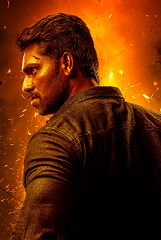|
|
||
|
Pro Tools
FILMFESTIVALS | 24/7 world wide coverageWelcome ! Enjoy the best of both worlds: Film & Festival News, exploring the best of the film festivals community. Launched in 1995, relentlessly connecting films to festivals, documenting and promoting festivals worldwide. Working on an upgrade soon. For collaboration, editorial contributions, or publicity, please send us an email here. User login |
Surya, Review: Twilight zone
Surya, Review: Twilight zone Giving no clue about its content, Surya is an eponymous title, being the short form of the name of the protagonist. Symbolically, it also stands for the sun, as the dispeller of darkness. While there is no denying that the hero of the film does what all action heroes do, namely dispel darkness by annihilating the baddies, the way he is made to go about it is not only jaded but beaten to death, pun intended. Surya, made in Marathi language, with a generous dose of Hindustani, is stuck in a time warp and moves retrograde into the era of the 1980s, when the politician-police nexus was still somewhat a novelty in the Hindustani films domain, and when an actor-turned-director named Nana Patekar played an army-man who launches a Prahaar (attack) against the scum of the earth. The influence is undeniable.
Captain Surya lives in an old chawl (shanty), in Mumbai, along with his sister Arya and parents Nana and Vatsala. His father is a police constable, while he is a commando. Surya, whose full name is Suryakant Patil, specialises in anti-Naxalite operations and is able to take on several Naxal terrorists alone. A ‘consortium’ of greedy businessmen is eyeing the chawl to demolish it and grab the plot, in order to develop it into a commercial property. But the inhabitants of the chawl, who number about a hundred, are unwilling to move out and live outside the city, as offered by the builders. The baddies, however, have other means of persuasion. Consisting of Naru Reddy, his drug addict son Munna Reddy, an underworld don Razak (should have been spelt Razzaq), ChampakSheth Patel and the Chief Minister of the state, Abasaheb Deshmukh, the gang decides to take matter into its own hands. They send a bunch of hoodlums to the chawl to teach the residents a lesson. Munna grabs Nana and suffocates him to death after thrusting his face in the water tank. He then rapes Arya, even as the chawl residents watch helplessly, held back by the goons. All this happens when Surya has just left for duty after a short period of leave from duty. Somebody manages to call him on the mobile phone, as he is still on his way to the railway station. Surya turns his car around and heads back home, only to find his mother fainted and his beloved Kajal in tears. Surya goes to the police station, but the corrupt cop Uday Singh, who works for the consortium arrests him instead and subjects him to torture.
While his wife Reshma is credited as producer of the film, Mangesh Thange is credited with story, screenplay (along with Vijay Kadam) and dialogue is penned by Vijay Kadam, Mangesh Kedar and Hemant Edlabadkar. There is no novelty in the story at all. All through the film, one gets the feeling of déjà vu and ennui. The screenplay moves in predictable directions. Corrupt builders and corrupt cops, corrupt and greedy politicians, forcible evacuation of chawl residents, the protagonist taking on the evil-doers one by one and finally going for the biggie are all tropes that do not jot the intellect one bit. A romantic track, quite unnecessary for the plot, is woven in to insert songs and a touch of sexual attraction. The only possible redeeming factor is that Riya is not kidnapped/raped/bound, and then rescued in the nick of time. Dialogue is purely functional, and the Hindi and Gujarati touches seem contrived and half-hearted. One must comment about four directorial touches of Hasnain Hyderabadwala (The Killer, Jashn: The Music Within). Firstly, the pre-credits voice-over about Mumbai, in general, showing Shivaji’s statue, Chhatrapati Shivaji Maharaj Railway Terminus and the Gateway of India, among other sites, with a deep base voice over, which reveals itself as that of Razak, who ends with a statement that he first tries to buy over his opponents/targets, and when that fails, he kills them. The film the shows us such an execution and we see Razak in full glory, arriving in a helicopter, along with a bunch of machine-gun toting individuals. You could conclude from this introduction that the film’s central character is Razak, the ‘bhai’ (don). Bhai he is, but he is not the central character at all, as you might presume, given the grand introduction. Razak is merely one of the players in the consortium. The second is a touch that goes well with the narrative. In association with the editor, the director, employs flash forward, a technique not commonly used. While Munna is being beaten badly by Surya, the film goes into a flash forward mode, showing him on a stretcher and gasping for life, at least twice, with his father, Naru Reddy, distraught at the sight. By the third flash forward, it has become a reality. A deft touch. Thirdly, in another scene, a woman, a neighbour, Riya, is bandaging Surya’s hand and takes out a safety pin from her cleavage to hold the bandage in place. This causes Kajal, who sees the scene, to get upset, and it takes some persuading from Surya to convince her that he has no soft corner for that woman. But such moments are like ships in the desert, hard to come by, and lastly, the confrontation between the Chief Minister and Surya, wherein, a lot is made of the time of 3 o’clock. The scene is an amateurish attempt at creating suspense.
As Surya, Prasad Mangesh looks the part. No killer good looks and a requisite physique. Problem is he has nothing really challenging to do. There is not much mourning at the death of his father and sister, and for the rest, he is merely fighting, often with the help of wires, and hurling his opponents like projectiles. In the songs, too, he comes across as nonchalant. And he yells out “UdaySingh” once too often, with the help of reverb sound. It does not sound convincing. Ruchita Jadhav as Kajal looks pretty and acts coy, when the situation demands. But she is there only because a heroine was needed and some songs could be picturised on her and Surya. Devashi Khanduri plays Riya and does a good job of it, speaking Hindustani. Razak is played by Hindustani films’ old-timer, Hemant Birje, best-known for playing Tarzan, in a film made by B. Subhash. With his dominating physique, he just slides into the role. My feeling is that his voice has been dubbed by someone with a rich baritone. Moreover, his dialogue is in both Marathi and Hindustani, which does not strike you as authentic. Sadly, he has a very small role and we do not see more of his really cold-blooded villainy, which is expected after the pre-credit titles scene. Akhilendra Mishra, another Hindustani films’ veteran, has a much bigger part and gets to speak many more lines, almost all in Hindi. With a surname like Reddy, that does sound odd. A veteran of villainy, he seems to enjoy the misdeeds that he is part of. When his son, Munna, dies, the grief he shows becomes unintentionally funny, coming from a hardcore honcho. Harry Josh (Tarzan: The Wonder Car, Wanted, Naksha, Boss; in Boss, he plays a man sent to kill Surya, the same thing he is ordered to do in this movie) is a scary Munna Reddy, both in built and in demeanour. As UdaySingh More, Ganesh Yadav is typecast, and the direction is not of much help. No cop, howsoever corrupt he might be and whatever connections he might have, will indulge in graft as openly as he does. Opposition party leader Tatya Patil is played by Uday Tikekar, and he does well. A familiar face, Pankaj Vishnu dons the role of Chief Minister Abasaheb Deshmukh. He looks a bit young for the role and his confidence in a life-threatening situation seems totally misplaced. Playing Nana Patil, Arun Nalawade exhibits a lot of derring do, all of it without any back-up, though. Jasbir Thandi enacts the role of ChampakSheth Patel, peppering his Marathi with Gujarati, to justify his name. In the supporting cast are Sanjeevani Jadhav, Raghavendra Kadkol, Deepjyoti Naik, Pradeep Patwardhan, Dileep Sadwilkar, Gauri Deshmukh and Sandesh Jadhav. Madhu S. Rao sticks to the basics in his photography, Rahul Bhatankar does a decent job of the editing, though there are continuity jerks, probably due to cuts imposed by the Central Board of Film Certification. Music by Dev Chauhan adds to the film, and some of the songs are indeed well-tuned. One item song is impressively picturised, except for the way in which the dancer keeps invitingly slapping her buttocks, back to the camera. Four lyric writers and seven singers have been used to compose the songs, a couple of them (or maybe three) being in Hindi. Surya means the sun, but instead of its blinding light, the film slides into twilight zone, moving more towards sunset than sunrise. Rating: * ½ Trailer: https://youtu.be/2jA0Ps8jebY 05.01.2023 | Siraj Syed's blog Cat. : Akhilendra Mishra Arun Nalawade B. Subhash Central Board of Film Certification Deepjyoti Naik Dev Chauhan Devashi Khanduri Dileep Sadwilkar Ganesh Yadav Gauri Deshmukh Gujarati Harry Josh Hasnain Hemant Birje Hemant Edlabadkar Hindustani Hyderabadwala Jasbir Thandi Madhu S. Rao Mangesh Kedar Mangesh Thange Marathi Nana Patekar Pankaj Vishnu Pradeep Patwardhan Prahaar Prasad Mangesh Raghavendra Kadkol Rahul Bhatankar Ruchita Jadhav Sandesh Jadhav Sanjeevani Jadhav Tarzan Uday Tikekar Vijay Kadam Independent FILM
|
LinksThe Bulletin Board > The Bulletin Board Blog Following News Interview with EFM (Berlin) Director
Interview with IFTA Chairman (AFM)
Interview with Cannes Marche du Film Director
Filmfestivals.com dailies live coverage from > Live from India
Useful links for the indies: > Big files transfer
+ SUBSCRIBE to the weekly Newsletter Deals+ Special offers and discounts from filmfestivals.com Selected fun offers
> Bonus Casino
User imagesAbout Siraj Syed Syed Siraj Syed Siraj (Siraj Associates) Siraj Syed is a film-critic since 1970 and a Former President of the Freelance Film Journalists' Combine of India.He is the India Correspondent of FilmFestivals.com and a member of FIPRESCI, the international Federation of Film Critics, Munich, GermanySiraj Syed has contributed over 1,015 articles on cinema, international film festivals, conventions, exhibitions, etc., most recently, at IFFI (Goa), MIFF (Mumbai), MFF/MAMI (Mumbai) and CommunicAsia (Singapore). He often edits film festival daily bulletins.He is also an actor and a dubbing artiste. Further, he has been teaching media, acting and dubbing at over 30 institutes in India and Singapore, since 1984.View my profile Send me a message The EditorUser contributions |































